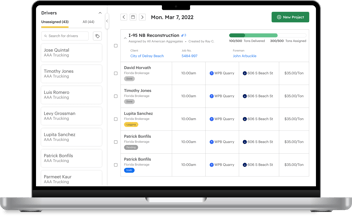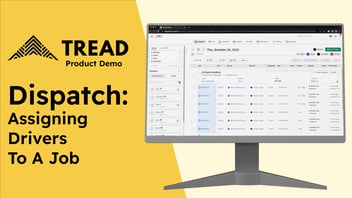9 Tips to Become a Successful Truck Dispatcher
What are truck dispatcher responsibilities?
Working as a trucking dispatcher can mean long, very focused hours. They are responsible for driver and trip scheduling and all driver communication while they are on the job. This type of communication can involve information about traffic delays, vehicle breakdowns, project delays, or delivery issues.
Truck dispatchers are also responsible for recording transportation expenses like mileage, fuel use, and repairs. They are also expected to keep track of all shipping and delivery details. They plan routes that will ultimately save the driver’s time and the company money.
Lastly, they may ensure the accuracy of completed timesheets, payroll, and other summaries, depending on the size of the company they work with. They can even be responsible for sourcing new drivers or external trucking companies to fulfill ever-increasing project demands.
Save up to 30% in time and cost savings for your dispatching operations. Request a free demo of Tread’s truck dispatch software today.
What makes a good dispatcher?
Working as a dispatcher is more than showing up and taking a few calls on the radio. A truly excellent trucking dispatcher possesses the following skills and traits:
- Organized
- Focused
- Attention to detail
- Ability to multitask
- Adaptable
- High level of confidence
- Superior communication
- Empathic and compassionate
- Exceptional emotional self-control
As a trucking dispatcher, there is rarely any downtime. A good dispatcher must be able to coordinate trip schedules, manage routes, and handle calls and requests from operators, third-party vendors, and their supervisors. They must make decisions confidently and have the knowledge to support them.
Superior communication skills are essential as a trucking dispatcher. Written and verbal skills are necessary, but the ability to listen with a level of empathy and compassion is also required. The ability to understand exactly what someone needs and act on it — professionally and efficiently — is a skill that makes a dispatcher great.
Working as a trucking dispatcher can mean dealing with highly stressful and emotional situations. The ability to remain calm and act with reason, instead of emotion, is essential to success in this role. At times, dispatches change and can go in a different direction than originally planned. This is why it is important to maintain a level of flexibility and adaptability within the role. Thinking quickly and making good decisions and judgments with little time to plan ahead.
Is it hard to be a dispatcher?
Truck dispatching requires a high-level of organization, focus, attention to detail, and patience. Dispatchers constantly manage a high volume of requests — somewhat like an air traffic controller of the trucking world. It can be a stressful and challenging position. However, people who possess the essential skills may be well-suited for a job as a trucking dispatcher.
Tips to improve trucking dispatch
If you’re a trucking dispatcher who is looking to improve your skill set or a company owner who is asking: “How can I improve my dispatch?”, we’ve put together a list of comprehensive tips on how to improve:
- Go for a ride
- Cultivate relationships
- Be open to feedback and collaboration
- Use truck dispatch management software
- Use one channel of communication
- Avoid “Mission Impossible” jobs
- Refine driver scheduling
- Set reasonable expectations
- Plan ahead
Allow us to explain these tips in detail…
1. Go for a ride
If a dispatcher has never done a fleet truck ride along, they will not have a complete understanding of the trip process. Getting a front-row seat to what a trucking assignment (i.e. a dispatch) takes to complete will greatly assist dispatchers when assigning jobs and communicating with drivers.
Building a rapport with your drivers will help you better understand each driver’s habits, values, and communication styles. This will increase productivity, improve workflow, and minimize friction or delays.
2. Cultivate relationships
Cultivating relationships with the company’s sales and estimating team is key to becoming a successful dispatcher. We recommend working closely with your estimating and sales departments to fully understand the volume of truck requests coming your way.
3. Be open to feedback and collaboration
Create an open channel for feedback and encourage drivers to use it. Feedback is a valuable tool that improves business flow and procedures while ensuring those involved feel valued and heard.
Beyond receiving feedback is the actual implementation of it. What good is driver input if it isn’t used? Consider actionable and constructive feedback and apply it to relevant processes.
4. Use truck dispatch management software
Part of truck dispatching is finding the most efficient routes that will save the company time and money. Implementing a truck dispatch management software program that takes the guesswork out of this task improves budget and frees up time for other tasks.
Truck dispatch management software also increases driver visibility, provides data on driver behaviour, fleet maintenance requirements, paperless e-ticketing, custom reports, and more. It is a highly useful tool for trucking dispatchers in the construction industry.
5. Use one channel of communication
Instead of sending information through a multitude of channels (email, text, radio, etc.), try to simplify the communication streams to one reliable method. Truck dispatch management software provides a solution to this problem by streamlining communication and housing all trip information in one, easy-to-use application.
6. Avoid “Mission Impossible” jobs
Mission Impossible jobs are activities or tasks that leave the driver little to no room for error. They are the deliveries with tight deadlines, which give the driver no margin for error. These unrealistic and rushed assignments can create animosity and tension between dispatchers and drivers and risk the reputation of the company.
Instead, plan trips with some compliance cushion and all parties will be satisfied.
7. Refine driver scheduling
Creating a trip schedule that works for all drivers and complies with HOS starts with gathering availability. Be sure to create a clear channel for all operators to submit their availability, request or block time off, and add their preferences. This information can help avoid scheduling conflicts or driver animosity.
Once you have availability, prioritize your drivers based on loyalty and efficiency. Use early start times as incentive for good behaviour.
Lastly, keep an updated record of subcontractors with a surplus of trucks. That way you’ll know where you can turn if you have a job that requires a larger fleet.
8. Set reasonable expectations
Managing expectations ahead of time with both drivers and site supervisors will make life as a dispatcher much easier. Communication is key for all parties involved to do their jobs efficiently and with minimal stress.
With drivers and sub-contractors: Set reasonable expectations by communicating to them when they should expect a dispatch from you each day.
With site supervisors: Set expectations with on-site resources, giving them visibility into trucks and deadlines for end-of-day trucking requests.
If there are any issues or concerns with the outlined expectations, work together to find a solution ahead of time.
9. Plan ahead
As a trucking dispatcher, a lot of time can be saved by planning ahead. For example, setting up geo zones, adding subcontractors, and creating templates when you receive the job frees up a ton of your time on the day of the project.
We also recommend ending each workday by spending 5-10 minutes confirming plans for the upcoming workday. For example, look at the weather forecast; has it changed since you created the trip schedule? If so, should you make any adjustments to the itinerary or projected delivery times? Planning ahead minimizes last-minute changes and improves general workflow and productivity.
Trucking dispatch success with Tread
To learn more about Tread’s dispatch management software, request a demo and we’d be happy to answer any questions!
Read On

9 ways to improve truck driver communication
Effective, efficient truck driver communication is critical to the success of your company. Not...

6 reasons not to create your own dispatch app
As the benefits of digitizing fleet management and dispatch become increasingly clear, many fleet...

Dispatch: How to Assign Drivers to a Job
Dispatching a job to your drivers should not be difficult. If your dispatchers are struggling to...

